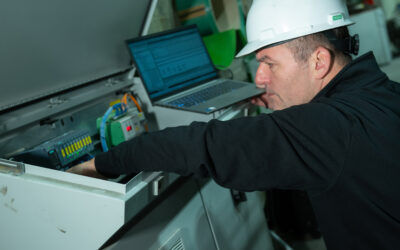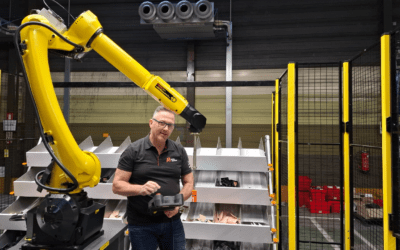What should you consider when choosing a SCADA/MES system?

In this article
- How scalable is the system?
- How user-friendly is the system?
- Can the system easily communicate with existing machines, sensors, and other systems?
- Is thet system well-secured and does it comply with relevant laws and regulations?
- What are the total costs of the system, and when will it pay for itself?
- Do you receive sufficient support from the supplier, and is the system regularly updated?
- How flexibel is the system?
- Is the supplier reliable and does it have experience in the specific industry?
- Comparison table of SCADA/MES systems
In modern industry, everything revolves around efficiency, reliability, and insight into the production process. A good SCADA/MES system plays a crucial role in this. It enables companies to collect production data, monitor processes, and intervene immediately in case of failures or deviations. However, not every system is suitable for every organization. The choice of the right SCADA/MES system determines whether a factory operates optimally or gets bogged down in inefficient processes and technical limitations. Therefore, it is important to carefully consider several key aspects when selecting a new system.
1. How scalable is the system?
Every company has unique processes and challenges. A SCADA/MES system must align well with the existing processes within a factory. This means the system should be able to control and monitor all machines, sensors, and other equipment in the production process effectively. Additionally, the system must be able to grow with the company.
Companies that invest in a SCADA/MES system often do so for the long term. A system that works perfectly today but no longer meets the needs in three years will cause problems. A scalable solution allows for expansion without the need for an entirely new system. For example, a factory that wants to add an additional production line or is considering replacing machines with newer models. A good SCADA/MES system can support these changes without major adjustments or additional costs.
2. How user-friendly is the system?
A SCADA/MES system must not only be suitable for IT specialists and technicians, but also for operators, maintenance technicians, and production managers. A user-friendly interface with clear dashboards and real-time data helps employees work quickly and efficiently.
With complex or difficult-to-operate systems, errors are more likely to occur, and training for staff takes longer. This leads to higher costs and productivity loss. A system with a logical setup and easy-to-use functionalities ensures that employees can respond more quickly to failures and gain better insights into production performance.
3. Can the system easily communicate with existing machines, sensors, and other systems?
A production environment often consists of a combination of older machines and new technologies. A good SCADA/MES system must therefore seamlessly integrate with existing hardware and software, such as PLCs, ERP systems en IoT devices.
A system that supports open standards such as OPC UA, MQTT, and SQL makes it possible for machines from different manufacturers to communicate with each other. This prevents a company from becoming dependent on a single supplier and ensures that future expansions can be implemented more easily and cost-effectively.
4. Is the system well-secured and does it comply with relevant laws and regulations?
With the increasing digitalization of production processes, the risk of cyberattacks and data breaches also grows. Security is therefore an essential factor when choosing a SCADA/MES system.
A well-secured system includes features such as user authentication, encrypted data communication, and clear access rights. This ensures that only authorized individuals can access critical systems, minimizing the risk of unauthorized changes or cyberattacks. Additionally, the system must comply with laws and regulations, such as the GDPR for data protection and ISO 27001 for information security.
5. What are the total costs of the system, and when will it pay for itself?
A SCADA/MES system is an investment that should pay off over time. The costs not only include the purchase price but also implementation, maintenance, licenses, and employee training. Therefore, it is important to consider the total cost of ownership and not just the initial price.
A good SCADA/MES system will actually result in savings in the long run, as it increases production efficiency, reduces downtime, and optimizes energy consumption. A system with a transparent licensing model, without unexpected additional costs, prevents surprises and helps companies plan their budget.
6. Do you receive sufficient support from the supplier, and is the system regularly updated?
Technology is evolving rapidly, and a SCADA/MES system must continuously adapt to new developments. Regular software updates ensure that the system remains secure, stable, and compatible with new technologies.
Additionally, good technical support is essential. A supplier that responds quickly to failures and prevents issues helps avoid production loss and frustration on the shop floor. Therefore, companies should choose a system with an active development community, expert support, and regular software updates.
7. How flexible is the system?
No two production facilities are the same. Therefore, a SCADA/MES system must be flexible enough to meet specific requirements and needs. The ability to customize dashboards, alarms, and workflows without complex programming knowledge gives companies the freedom to manage processes more efficiently and effectively.
A system that is easily adaptable prevents companies from being stuck with a solution in the future that no longer meets their needs. This makes it easier to respond to changes in production capacity, new regulations, or technological innovations.
8. Is the system reliable and does the system integrator have experience in the industry?
The choice of a SCADA/MES system is not only about the technology but also about the company that delivers and implements it. A reliable supplier is essential to ensure that the system continues to function well, not only now but also in the future.
An experienced and specialized supplier understands the challenges within the industry and offers not just software, but also advice, support, and ongoing development. The supplier should have a proven track record and experience with implementations in similar sectors. A stable company with a long-term vision provides assurance that the software will be maintained and continuously developed.
Additionally, the quality of service is a decisive factor. A good supplier provides fast and expert support, clear documentation, and regular updates. This prevents downtime and ensures that companies always work with the latest and most secure technology.
A SCADA/MES system is a long-term investment. The right supplier acts as a strategic partner who not only implements the system but also helps continuously improve the automation processes and grow with the developments within the industry.
Comparison table SCADA/MES systems
To help you choose the right SCADA/MES system, we have created a comparison table. This table compares the key aspects of different systems, so you can quickly gain insight into the advantages and disadvantages. We have already filled in Ignition, the software we work with.
In this article
- How scalable is the system?
- How user-friendly is the system?
- Can the system easily communicate with existing machines, sensors, and other systems?
- Is thet system well-secured and does it comply with relevant laws and regulations?
- What are the total costs of the system, and when will it pay for itself?
- Do you receive sufficient support from the supplier, and is the system regularly updated?
- How flexibel is the system?
- Is the system reliable and does the system integrator have experience in the industry?
- Comparison table of SCADA/MES systems
Stay up-to-date
Receive the newsletter in your inbox every month.
Or follow us
Share this article
Others also viewed
Time to revise or replace your PLC? Use the decision tree
A PLC is a crucial component of many industrial processes. However, like any technology, a PLC has a lifespan, and sooner or later, the question arises: should we revise or replace it? Use this decision tree…
Jean, the driving force behind our robotics department
While robotics has been a key player in the industry for decades, it has recently gained even more ground as an automation solution. To meet the increasing demand from customers, we established a dedicated…
Global robotics trends 2025
The global market for industrial robots continues to grow and has reached a record high of $16.5 billion in 2025. Innovations in technology, changing market conditions, and new applications are driving the increasing demand for automation.



